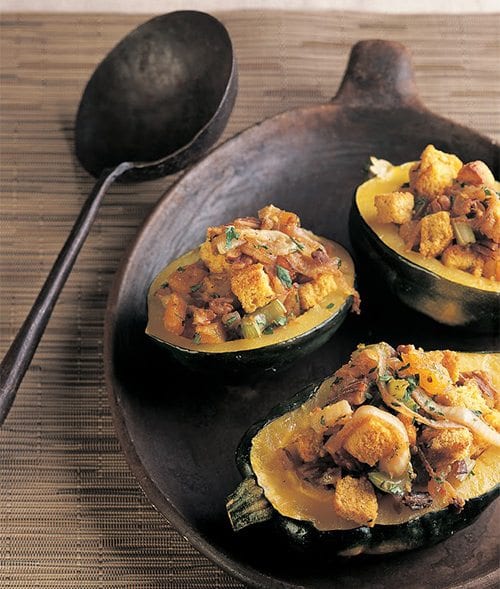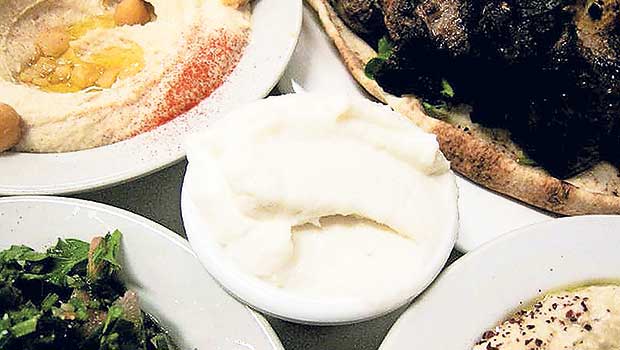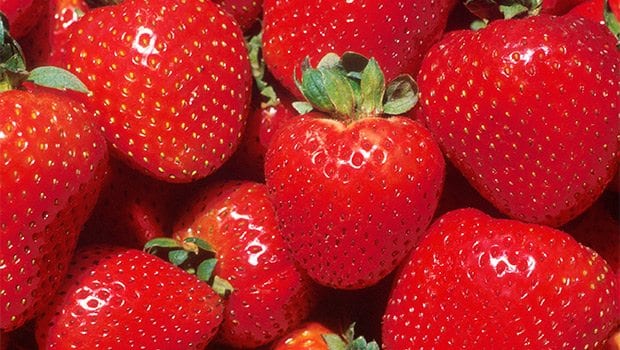
This recipe for acorn squash from the American Institute for Cancer Research is a tasty complement to any Thanksgiving meal. Acorn squash is not only colorful with its green skin and orange meat it’s also good for you. The orange color comes from beta-carotene, a phytochemical, or antioxidant that may reduce the risk of cancer and heart disease. Phytochemicals can neutralize free radicals, errant molecules that are capable of damaging cells and even DNA.
The dried apricots in this recipe also provide their share of beta-carotene.
Our bodies convert beta-carotene into vitamin A, which is necessary for cell growth, a healthy immune system and good vision. In addition to vitamin A, acorn squash is a good source of vitamin C, fiber and potassium.
Throw caramelized onions, garlic, celery, sage and parsley into the mix – all with their own set of cancer-preventive substances – and you have a tasty and healthy dish.
Acorn Squash Stuffed with Apricots and Cornbread
Ingredients:
- 4 cups cornbread, cut into ½-inch cubes
- 2 tbsp. extra-virgin olive oil, plus more for brushing squash
- 2 large Spanish onions, thinly sliced
- ½ cup finely diced celery, including 3 to 4 leaves
- 2 tbsp. finely chopped fresh sage or 1½ tsp. dried sage
- 2 tsp. finely chopped garlic
- 1½ cups hot water or hot vegetable broth
- ½ cup chopped dried apricots
- ½ cup lightly toasted chopped pecans (optional)*
- 2 tbsp. finely chopped flat leaf parsley
- Salt and freshly ground black pepper to taste
- 3 large acorn squash, halved lengthwise and seeded
Directions:
- Preheat oven to 400 degrees F. Spread cornbread cubes on baking sheet and toast in oven for about 10 minutes, turning occasionally until lightly browned. Transfer to bowl and set aside.
- In large, heavy saucepan, heat 2 tbsp. olive oil over medium-low heat. Add onions, celery, sage and garlic. Sauté for 20 minutes, stirring frequently until onions are caramelized. Add water or broth, apricots and pecans. Raise heat to high, bring mixture to boil, then reduce heat to low. Simmer for about 10 minutes until liquid is reduced by about ⅓. Remove from heat and stir in parsley. Gently mix in cornbread and stir in salt and pepper to taste. Set mixture aside while preparing squash.†
- Reduce oven temperature to 350 degrees F. Place squash halves cut side down in baking pan(s) or dish(es) large enough to hold squash in single layer. Brush halves lightly with olive oil. Pour ½ inch water into each pan and bake for 20 minutes. Squash should be barely tender when pierced with fork.
- Transfer squash to plate and set aside until cool enough to handle. Fill halves with cornbread mixture, set in baking pans stuffing side up and return to 350-degree oven. Bake for about 1 hour until tip of knife pierces squash easily. Before serving, cut each squash in half lengthwise again.
*Note: To toast pecans, put in small skillet over medium-high heat and stir frequently for 2 to 3 minutes until lightly browned. Immediately transfer nuts to small dish and cool.
† Note: filling can be prepared up to 1 day in advance; refrigerate in tightly covered container. Half-cooked squash can be refrigerated up to 8 hours, tightly wrapped in plastic wrap. Filled squash halves can likewise be wrapped in plastic wrap and refrigerated for up to 4 hours before being baked.
Makes 12 servings.
Per serving:
Calories: 226
Total fat: 9g
Saturated fat: 1g
Carbohydrates: 36 g
Protein: 4 g
Dietary fiber: 3 g
Sodium: 272 mg
Source: American Institute for Cancer Research






